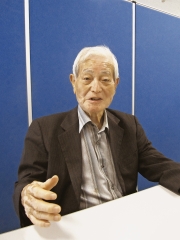Fight for human rights in Okinawa

Hiroaki Fukuchi, Head of the Okinawa Human Rights Association, said, “The Okinawan people’s sense of human rights is as good as that found anywhere in the world,” at Ryukyu Shimpo Newspaper Company, Ameku, Naha City
May 3, 2011 by Eriko Tamaki, Ryukyu Shimpo
The Okinawa Human Rights Association, formed for the protection of human rights for people in Okinawa under the U.S. military administration, and for education about and encouragement of awareness of civil liberties, marked the 50th anniversary of its establishment.
Despite coming under the “Peace Constitution,” which extols respect for basic human rights and the renunciation of war, since its reversion to Japanese sovereignty Okinawa has seen an endless stream of incidents and accidents related to the U.S. military bases.
The Japanese government is pressing forward with the transfer plan to Henoko, ignoring criticism from the Okinawan people, who call for the relocation out of the prefecture of facilities now located Futenma Air Station.
Hiroaki Fukuchi, Head of the Okinawa Human Rights Association, said, “Doesn’t the ‘Peace Constitution’ apply to Okinawa? Okinawa is still discriminated against by the Japanese government despite it being part of Japan.”
The Fight for human rights continues in Okinawa.
Before its reversion to Japan, Okinawa witnessed many U.S. military personnel who were either not charged despite committing violent crimes, and or were found not-guilty in military courts. In the days when Okinawan people required a passport to travel outside the prefecture, many who were judged by the U.S. military administration to be “undesirable” were not granted passports.
“Neither the Japanese Constitution nor the American Constitution apply to Okinawa. Okinawa has been put to the side. Through the years Okinawan people have cried themselves to sleep over human rights abuses they have experienced. It is a wasteland in terms of human rights issues,” said Fukuchi.
Fukuchi, who had a travel ban placed on him and was subjected to interrogation by the U.S. Counter Intelligence Corps, felt the need for the citizens to stand up and fight back.
In April 1961, when he was working for the Okinawa Teachers’ Association, which played a central role in the reversion movement, he appealed to the chief editor of Ryukyu Shimpo, Okinawa Times, attorneys and legislative authorities to come together to form the Okinawa Human Rights Association.
As soon as the Association was formed it received many cases to consider, among them those related to matters such as U.S. military personnel abandoning their wives and children, abuse of police powers, trafficking of female employees, and women falling victim to sexual assaults.
The Association received 500 cases in the first five years, and in particular, it played a vital role in the lawsuit in 1965 that Okinawa took in Tokyo District Court against the Japanese government during the period under the U.S. military administration, demanding that basic human rights be guaranteed by the Japanese Constitution,
With regard to the current situation in which so many U.S. military bases are concentrated in Okinawa, bringing with them risks that threaten the lives of local Okinawan people, Fukuchi commented that, “The Japan-U.S. Security Treaty sits above the Japanese Constitution.”
He continued, emphatically stating that, “Okinawan people are keenly aware of their human rights because they have been occupied by the United States and have had their rights violated through the years. They must continue to point out the issues surrounding the Japan-U.S. Security Treaty and the Japan-U.S. Status-of-Forces Agreement – matters that are difficult for the people of the main islands of Japan to grasp. For the sake of peace in East Asia, now is the time for the people of Okinawa to push forward their sense of international human rights.”
(English Translation by T&CT, Mark Ealey)
Previous Article:New Caledonia joins 5th Uchinanchu Festival for the first time
Next Article:Three new hybrid orchids registered with the Royal Horticultural Society
[Similar Articles]
- History book on human rights in Okinawa published
- Editorial: In the new year, step toward self-reliance together
- 71 years after the enactment of the Japanese constitution, assemblies take place all over Okinawa regarding the Article 9
- International Human Rights Law Association holds Japan-Okinawa debate regarding UN review
- At Constitution Symposium, Dr. Tokuda speaks of peace and “non-war” as a pillar for doctors
 Webcam(Kokusai Street)
Webcam(Kokusai Street)


